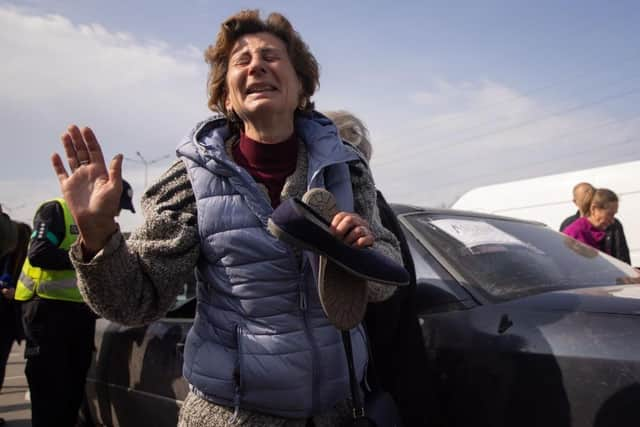Ukraine-Russia: European Union cannot agree on Russian oil embargo as new death toll figure revealed
The UN's human rights office (OHCHR) said since the start of the Russian invasion on February 24, it has recorded 3,153 civilian deaths in Ukraine – but warned the true death toll was likely to be "considerably higher".
Satellites have also identified mass burial sites near Mariupol containing about 200 graves, which are likely used to bury civilian bodies.
Advertisement
Hide AdAdvertisement
Hide AdA meeting of EU energy ministers came to no conclusion on Monday over a possible embargo on Russian oil, amid reports of division in the bloc over the issue. The next package of EU sanctions is to be finalised on Tuesday.


At a press conference held after the meeting, Barbara Pompili, minister for the Ecological and Inclusive Transition of France, said the meeting had focused more on gas and that an oil embargo would only be discussed in coming days. Reports have claimed that an exemption could be granted to countries like Hungary, which has made it clear that it would block an embargo.
Germany, which previously looked set to be against the embargo, said on Monday it was not fully ready to block Russian gas, but could manage a phased-in oil embargo. It was argued last month the £840 million being sent every day to Russia in the form of energy payments was 35 times more than the amount the EU had actually donated to Ukraine to help the country defend itself.
Meanwhile, the safe evacuation of civilians from the war-hit city of Mariupol has been hit with delays. Buses left the city on Monday morning to travel on humanitarian corridors to the Ukrainian-controlled city of Zaporizhzhia. However, as of Monday night they had not arrived at their destination in the Ukrainian-controlled city of Zaporizhzhia.
The evacuation follows the safe departure of some civilians from the Azovstal steel plant at the weekend, where many had been sheltering for weeks in terrible conditions.
Mariupol Ukrainian authorities said more buses had departed from the city and would pick up people who had previously been evacuated to Russian controlled villages on the way. Locals still living in the other parts of the city, which has been all but destroyed by heavy bombing, were also allowed to leave.
Video posted online on Sunday by Ukrainian forces showed elderly women and mothers with small children climbing over a steep pile of debris out of the sprawling Azovstal steel plant's rubble and eventually boarding a bus. The evacuation was carried out in agreement with the United Nations and the International Red Cross.
People who emerged from the plant have reported it was the first time they had seen daylight in two months and described the cramped conditions living in shelters at the plant, where people were forced to use plastic bags as toilets.
Advertisement
Hide AdAdvertisement
Hide AdMore than 100 civilians were expected to arrive in the Ukrainian-controlled city of Zaporizhzhia on Monday, Ukrainian president Volodymyr Zelensky said on Sunday. He hailed the evacuation as the first time the “vital” humanitarian corridor was working.
Previous attempts have resulted in civilians reporting their vehicles being fired on. Ukrainian officials have repeatedly accused Russian forces of shelling agreed-upon evacuation routes.
Anastasiia Dembytska, who took advantage of the brief ceasefire around the evacuation of civilians from the steel plant to leave with her daughter, nephew and dog, said her family survived by cooking on a makeshift stove and drinking well water.
She said she could see the steel plant from her window, when she dared to look out.
"We could see the rockets flying and clouds of smoke over the plant”, she said.
The evacuation came as the port city of Odesa reported a missile strike that hit a religious building.
President Zelensky said on his Telegram channel: “Today we finally managed to start the evacuation of people from Azovstal – after many weeks of negotiations, after many attempts, different meetings, calls and proposals. There was not a single day when we did not try to find a solution that would save our people. Today, for the first time in all the days of the war, this vital corridor has started working. For the first time there were two days of real ceasefire.
"More than a hundred civilians have already been evacuated, women and children fleeing hostilities there. Given all the complexities of the process, the first evacuees will arrive in Zaporizhzhia tomorrow morning. Our team will meet them there. I hope that tomorrow all the necessary conditions will be met to continue the evacuation of people from Mariupol. We plan to start at 8am.”
Advertisement
Hide AdAdvertisement
Hide AdA Ukrainian defender of the steel plant urged groups like the UN and the Red Cross to ensure the safety of those being evacuated.
Sviatoslav Palamar, deputy commander of the Azov Regiment, said there should be guarantees from "a third party – politicians, world leaders – who will co-operate to negotiate with Russians to extract us from here".
Another of the plant's defenders said Russian forces resumed shelling the facility on Sunday as soon as the evacuation of a group of civilians was completed.
Denys Shlega, commander of the 12th Operational Brigade of Ukraine's National Guard, said in a televised interview on Sunday night that several hundred civilians remain trapped alongside nearly 500 wounded soldiers and "numerous" dead bodies.
"Several dozen small children are still in the bunkers underneath the plant," Mr Shlega said.
UN humanitarian spokesman Saviano Abreu said civilians arriving in Zaporizhzhia, about 140 miles north-west of Mariupol, would receive immediate humanitarian support, including psychological services.
A Doctors Without Borders team was at a reception centre for displaced people in Zaporizhzhia, in preparation for the UN convoy's arrival.
Comments
Want to join the conversation? Please or to comment on this article.
